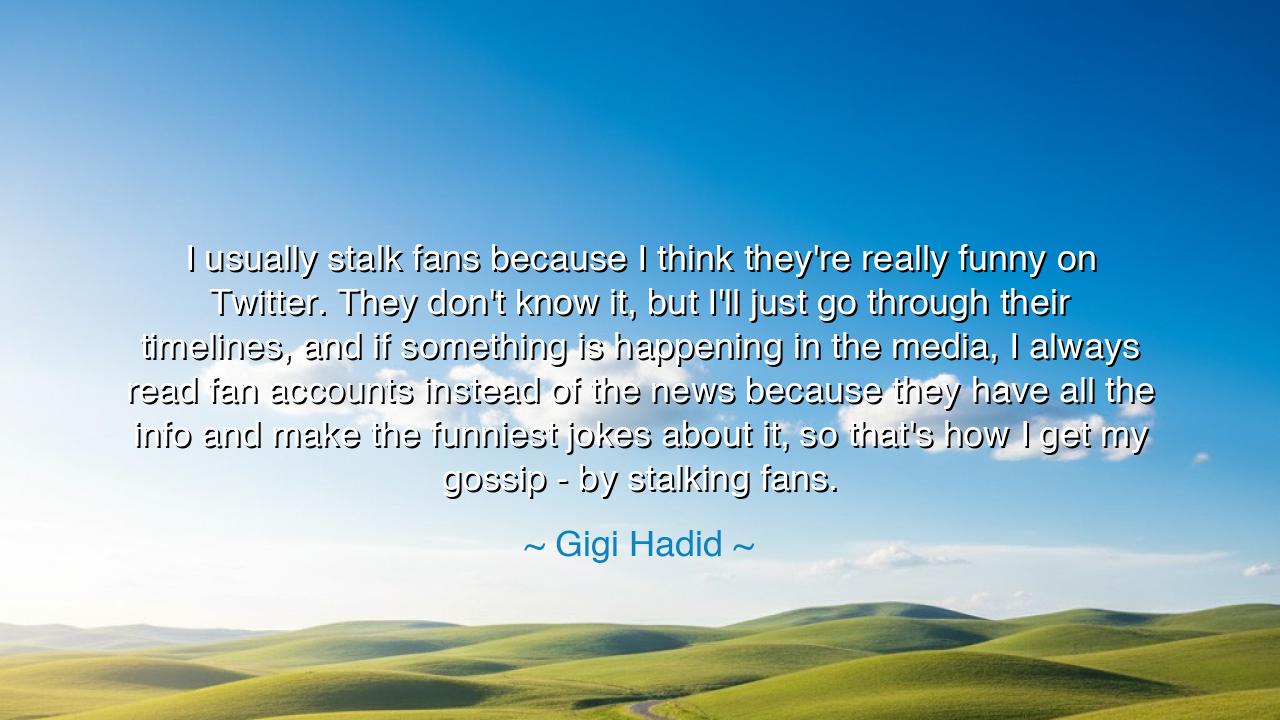
I usually stalk fans because I think they're really funny on
I usually stalk fans because I think they're really funny on Twitter. They don't know it, but I'll just go through their timelines, and if something is happening in the media, I always read fan accounts instead of the news because they have all the info and make the funniest jokes about it, so that's how I get my gossip - by stalking fans.






“I usually stalk fans because I think they’re really funny on Twitter. They don’t know it, but I’ll just go through their timelines, and if something is happening in the media, I always read fan accounts instead of the news because they have all the info and make the funniest jokes about it, so that’s how I get my gossip — by stalking fans.” – Gigi Hadid
In these playful yet revealing words, Gigi Hadid opens a window into the curious bond between the admired and the admirer, between the star who stands upon the stage and the multitude who watch below. Though spoken in jest, her confession carries the weight of a deeper truth: that in an age of endless noise and glittering headlines, authenticity and humor are often found not in the palaces of power, but among the voices of the people. She, a figure of fame and light, finds refreshment not in the sterile halls of media but in the unfiltered laughter and wit of her fans. And in that act — in that quiet “stalking” — she becomes one of them, returning to the simplicity of shared humanity.
The ancients would have understood this paradox. Kings, poets, and philosophers often walked among the common folk in disguise, seeking the pulse of truth beneath the veil of grandeur. Gigi’s “stalking” of her fans is but a modern echo of this ancient practice. The emperor Harun al-Rashid of Baghdad would wander his city at night in secret, listening to his people’s jokes and laments, learning the true state of his realm not from advisors, but from laughter and gossip. So too does Hadid — not with a crown, but with a smartphone — listen to her people, finding in their humor a more faithful account of the world than in the polished scripts of journalists.
For when she says that fans “make the funniest jokes” and “have all the info,” she speaks a quiet truth about our age: that wisdom is no longer the property of the elite. The walls between celebrity and crowd have grown thin, and in that thinning lies both danger and beauty. The people, armed with wit and candor, have become the new chroniclers of their time. Their humor is their history; their jokes, their form of resistance. Gigi’s admiration for them reveals her humility — the recognition that joy and knowledge are found in the humblest places, and that laughter is the language of truth.
It is no small thing that she prefers fan accounts to the news. The news tells us what happened; the people’s humor tells us how it feels. One reports facts; the other reveals the heart. Humor, when born of truth, becomes a bridge — connecting those who live in the public eye to those






AAdministratorAdministrator
Welcome, honored guests. Please leave a comment, we will respond soon